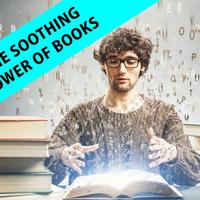The soothing power of books - 6 Minute English - YouTube
Hello. This is 6 Minute English from
BBC Learning English. I'm Neil.
And I'm Georgina.
What type of books do you like
to read, Georgina?
I love reading crime fiction - you know
detective stories by authors like
Ruth Rendell or Agatha
Christie.
Really? Do you find them relaxing?
I wouldn't say relaxing exactly, but I get
really involved in the story - trying to work
out who the murderer is... then
finding out on the last page.
That's interesting because today
we'll be looking at how books
can help us relax and
feel more alive during troubled times.
We'll be finding out how reading
is one of the best
ways to find relief from the pressures
of modern life.
Neil, are you talking about 'Bibliotherapy'?
Amazing detective skills, Georgina!
Exactly. 'Bibliotherapy' is
the prescription of books
as a remedy to sickness. It has
been around since 2013, when
the UK charity Reading Agency
published a list of books that
doctors could offer to patients,
tackling topics from depression
to dementia to chronic pain.
Since then, 1.2 million readers have
borrowed the scheme's books
from libraries. It's so
successful that it's about to be
extended to children as well.
I wonder which books have been
most popular over that time? In fact
that's my quiz question
for today. What is the best-selling book
of all time? Is it:
a) Harry Potter and the Philosopher's
Stone by J K Rowling,
b) A Tale of Two Cities by
Charles Dickens, or c) Don Quixote
by Miguel de Cervantes?
I'll say a) Harry Potter.
OK. Well, we'll find out later if you're right.
In 'Bibliotherapy', people meet up to read
together. Professor Philip Davis,
who runs these reading groups,
believes they help the
participants 'come more alive'.
Here he is speaking to BBC Radio 4's
You and Yours about
what he's discovered:
Above all, that it's not to do with scanning,
with quick reading, when
they're reading literature.
If they're just scanning, if you're just
looking for information, you go fast,
it's very easy,
it's automatic but when literature begins
to do something more
complicated than that
in an area that emotionally you
care about, the brain begins to
work from different parts,
from a different hemisphere and
it gets excited, it gets pre-emotional - you
can see the brain
coming to life and it's that life
that is important in terms of these
reading groups.
One type of reading is scanning - reading
quickly in order to find
specific information
or skimming the page to get
a general understanding.
But the real therapy happens when
a group reads literature - written
works such as novels,
poems or plays which are thought
to have artistic merit. When group
members read literature
their brains get excited and start working
from a different
hemisphere - a word meaning
'half a sphere' - usually half the Earth
or in this case, the human brain.
Reading literature in this this way makes
both the left and right hemisphere of the
brain come to life - start to be activated
again after a quiet period.
And it's this 'coming to life' that proves
the therapeutic effects of 'Bibliotherapy'.
Here's Professor Davis again explaining
how the benefits of group reading
are observed:
There are two methods really - you
can have ECG where you put
electrodes on the scalp
and it measures electricity so that
you can have a print-off of
a graph of the sudden
leaps than can happen at particular
moments in reading a poem
or short story or you can
go into the scanner, the FMRI, and there,
the blood flow, the oxygen indicates again
changes in the configuration of the brain
as it takes in this new stimulus.
The benefits of reading literature
with others can be felt by group members
as they begin
to feel more alive and able to cope
with life's ups and downs. But they can
also be measured
scientifically by recording
brain wave activity.
This can be done by carefully attaching
metal wires called electrodes
to the reader's scalp
- the skin under the hair on the head.
Brain activity is then measured by giving
the reader a stimulus - something
that encourages
activity in people. In this case, it could
be a poem or novel to read.
Or something really
stimulating - like a detective story!
Or a work of literature - which reminds me
of today's quiz question.
I asked you to name
the most popular book of all time,
and you said...
a) Harry Potter and the
Philosopher's Stone...
...which is definitely the most popular
book in the 21st Century.
But number one of all
time, selling over 500 million copies is
c) Cervantes' Don Quixote.
And there's even a
detective in it!
Today, we've been discussing the
therapeutic effects of meeting up
with others in a reading
group to read literature - writing of artistic
value, such as stories and poetry.
In contrast to scanning - reading quickly
to find facts - reading groups
use literature
as a stimulus - something that
encourages activity in people.
Reading stimulates both the left and right
hemispheres - the two halves of the brain,
and increases emotional activity
which can be measured on
the scalp - the skin under
the hair on a reader's head.
All of which helps people dealing with
trauma to come to life - feel active
and more alive
after a quiet period.
Right, that's it ... I'm off to the library!
If only you could... Thanks for listening
and remember you can find
many more stimulating
topics and vocabulary here at
6 Minute English on
BBC Learning English. Bye for now.
Bye!

